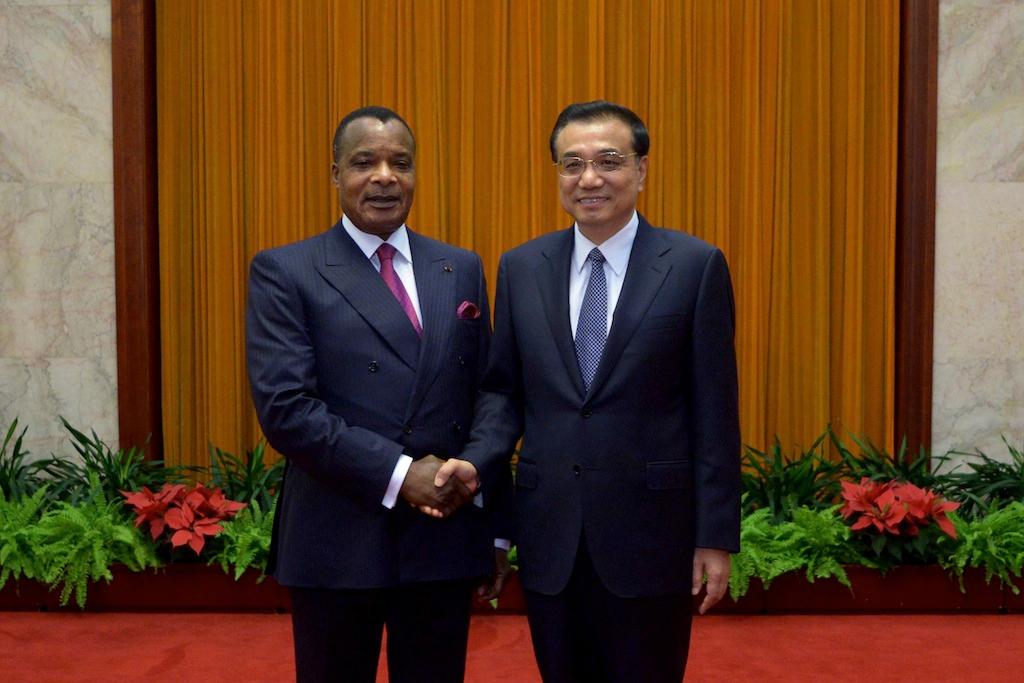A Democratic opportunity for both the US and Africa
Congo President Denis Sassou N’guesso (L) shakes with Chinese Premier Li Keqiang (R) at the Great Hall of the People in Beijing on June 13, 2014. Denis Sassou N’guesso is on a visit to China from June 11 to 19.
WASHINGTON DC — As Washington hosts the first US-Africa Leaders Summit, it’s worth comparing America and Chinese engagement in Africa. Both countries compete for access to the continent’s natural resources and growing consumer markets. For the sake of economic competitiveness, some experts urge President Obama to avoid the issues of democratic governance and human rights during the summit, just as China has done during summits in Beijing. This argument, however, misses the fact that promoting democracy in Africa is not only in the United States’ interest but is also a key advantage.
Stronger African democracies mean more developed, knowledge-based African economies, which are better for American business interests in the long run. Moreover, our willingness to address democracy and human rights head-on sends a clear message that our interests extend beyond Africa’s leaders to Africa’s people – a distinction that should not be overlooked.
Despite the recent narrative of “Africa Rising,” the world’s investors are still wary of doing business in Africa.
Although Foreign Direct Investment (FDI) in Africa has grown significantly over the past decade, it accounts for only 5.7 percent of global investment, and less than one percent of global US investment. Businesses still see investing in Africa as a high-risk venture, and serious concerns remain about countries with poor governance, high levels of corruption and weak rule of law.
Working with our African partners to find practical solutions to address these problems is integral to protecting the rights of Africans, but are also a prerequisite to creating environments that attract investment and trade. Comparing Freedom House’s measure of political and civil freedoms in Africa with the World Bank’s ease of doing business index, it’s clear that democracies are better for business.
The freedoms provided to citizens in a democratic society – protection of property, access to justice and the free flow of information – are the conditions businesses need for their investments to be safe and remain profitable.
Pressing African governments to respect democratic norms and obligations should be part of the Administration’s strategy to increase our economic interests in Africa.
Stronger democratic governance is also part of ensuring inclusive economic growth. Functioning institutions ensure that political and business leaders are held accountable and resources are invested back into communities in the form of government services such as education and health care. This type of inclusive growth can help African states improve the lives of citizens and transition from extractive- to knowledge-based economies.
The tiny island nation of Mauritius exemplifies this transition. Thanks in part to a stable democracy, the living standards of the population have dramatically increased, and Mauritius now has the highest human development levels in sub-Saharan Africa. This has allowed Mauritius to increase skill-based manufacturing and has become one of Africa’s largest textile producers. It is also the third largest destination for US FDI, behind only South Africa and Nigeria.
The Administration’s willingness to raise governance issues with African leaders is also a fundamental distinction between us and China in the minds of Africans across the continent. Recent polls show the vast majority of surveyed Africans – 71– percent prefer democracy over all other forms of government. And while perceptions of the US might vary around the world, many in Africa still see America as the leading example of a strong, successful democracy.
Our commitment democracy is why many see us as an essential partner in the effort to realize a more democratic Africa. A friend who teaches at Addis Ababa University put it well when he said that if it was a simple choice of economics, he would encourage his students to learn Mandarin. China is simply spending more money in Africa than the United States. But Africa’s future is not just about economics.
Citizens want the chance to live in societies where their rights are protected and where they have a say over how their countries are governed. In many countries, citizens don’t have the ability to push their governments on these issues; this is why they look to countries like the US to speak – sometimes forcefully – to authoritarian leaders because citizens themselves are denied this right.
The US’s commitment to promoting democratic governance should not be seen as a liability to economic interests, because it is a fundamental part of achieving them. This is why President Obama should be applauded for including a session on governance during the Leaders Summit. He should use this event to remind both American businesses and the African heads of state that we are not the Chinese, and don’t want to be. And that this is a good thing.
Daniel Calingaert and Kellen McClure are executive vice president and Africa program officer at Freedom House.
Every day, reporters and producers at The World are hard at work bringing you human-centered news from across the globe. But we can’t do it without you. We need your support to ensure we can continue this work for another year.
Make a gift today, and you’ll help us unlock a matching gift of $67,000!
